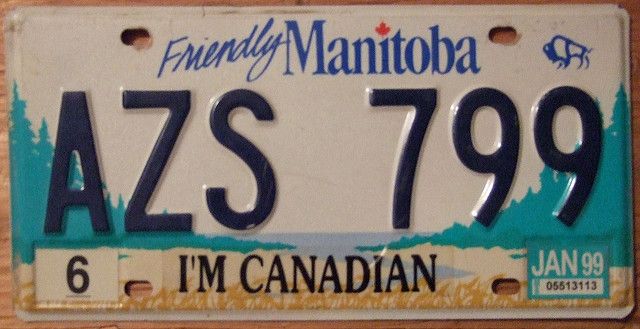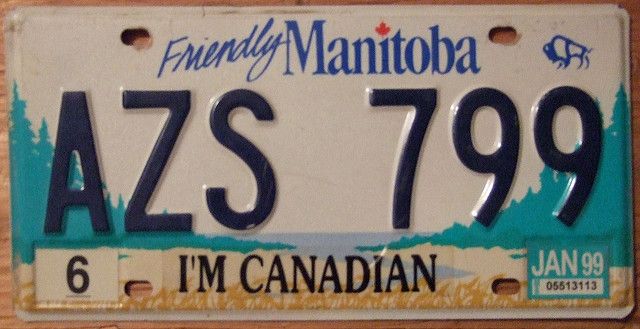Manitoba’s Waiting For You

By 2020, Manitoba’s own government predicts a shortage of 20,000 skilled workers in the province. And Manitoba is exactly the kind of safe and affordable place where you want to settle and raise a family. Maybe that’s why 15,000 immigrants a year are starting a new life in Manitoba.
Manitoba License Plate by Jerry Woody / Flickr / CC BY-SA 2.0
Manitoba was the first province to establish its own immigration program, the Manitoba Provincial Nominee Program, or MPNP. Its purpose is to seek out qualified skilled workers and business people to settle and work or start a business, and raise their families. There are two streams to the MPNP:
- MPNP for Skilled Workers: This stream selects trained and experienced workers from abroad who have the skills needed by the local labour market in the province. When selected, you are nominated by the MPNP to receive Permanent Residence visas through Immigration, Refugees and Citizenship Canada (IRCC). You then use your visa to move to Manitoba and find a suitable job based on your skills and experience.
- MPNP-B for Business: This stream recruits and nominates qualified business people from around the globe who have the intention of and the ability to move to Manitoba to start or purchase a business. Or you can partner with the owners of an existing business.
Remember, the opportunities in Manitoba are evident, but the responsibility for finding work or starting a successful business will be up to you. But take heart, a recent survey of new immigrants under MPNP that moved to Manitoba found that:
- 85% of Manitoba nominees were working 3 months after arrival in Canada;
- 76% of Manitoba nominees were homeowners only 5 years or less after arriving in Canada;
- 95% of Manitoba nominee families settled permanently in the community.
Lake Winnipeg by Non-dropframe / Wikimedia Commons / CC BY-SA 3.0
It is clear that MPNP is an outstanding success and is an excellent path to Canadian permanent residence and citizenship for those who qualify. And Manitoba is a great place to live and raise a family:
- Winnipeg is a culturally vibrant city of 750,000 with open prairie, rivers, and lake country an easy drive from town. Add family-friendly communities with a low cost of living, lots of leisure and sports activities, and a thriving economy, and you have a win-win for all involved. Winnipeg is not just a great city to work in, it’s a great city to live in. It has been as of late, the 4th top choice for immigrants to Canada, after Toronto, Vancouver, and Calgary.
- Manitoba is multicultural and has a dynamic francophone community which helps attract immigrants, although the language of work in the province is English. But there are around 200 languages spoken in homes around the province. Immigrants from around the world have been making their home in Manitoba for generations.
- Manitoba is affordable. Did you know that a family of five earning CAD$75,000 a year has CAD$17,000 more left over after taxes and basic costs, compared to the same family living in Toronto, Ontario? And a nice cottage near a lake in Ontario is a luxury most families in that province can only dream of. In Manitoba, on the other hand, it’s still a reality for hard working newcomers who settle and live and work in the province.
- Manitoba has a top notch free public health care and school system. When you are looking for a place to raise a family, these two services are the top of most people’s lists.
To ensure you are well prepared to apply for the MPNP nominee program, your ability to communicate skillfully in English is key. That means you are best to take an honest look at your own English abilities and do everything possible to improve your English language skills, if necessary. It’s simple: the better your English communication skills are, the better your job and the better your income. And the better your chances of being nominated.
Your first step should be to go to Job Bank and see what your job classification, or NOC, classification is. By finding out what language skills your job requires in Canada you can see what level of CLB – Canadian Language Benchmark – you will need. You will need a minimum of CLB level 4 to be able to come to Canada and you will need to take another English test when you take your Citizenship test for Canadian citizenship. You should realize a few facts about improving your English language skills:
- CLB 1 – 3: You are only eligible for menial work like washing dishes or a night shift in a bakery. You will not qualify for MPNP.
- CLB 4: You may get jobs like a child-care assistant or a home care worker (helping the elderly).
- CLB 5: You may get jobs like a cashier, or a food server, or an assembly line worker.
- CLB 6: You may be able to work in a retail store, as a security guard, or a bus driver.
- CLB 7: You may be able to work as a child care educator or health care aide.
- CLB 8: You may compete for most professional job openings and are considered fluent. You have what is called Job-Ready English.
Learn more about IELTS and CELPIP.
Remember these are general guidelines and each employer will have specific English language requirements. As well, the ability to use nuance and understand implied meaning in a conversation are vital so-called soft skills to have. They help you fit in and work well with others on the job.
Make sure you put in the work necessary to improve your English if you find your skills are not at the level you feel they need to be. It’s estimated that to improve your CLB scores by 1 level, you need to study full time 500 hours. That means at least 6 months if you put in over 15 hours a week. In other words, put in the time and effort to ensure your CLB score is a good one.
Finally, go here to explore several dozen communities in Manitoba that welcome immigrants and offer services to newcomers. Get a feel for the variety of local communities and what they might have to offer you as someone looking to settle and raise a family.
Manitoba’s waiting for you! What are you waiting for?

![Lake Winnipeg By Non-dropframe (Own work) [CC BY-SA 3.0 (https://creativecommons.org/licenses/by-sa/3.0) or GFDL (http://www.gnu.org/copyleft/fdl.html)], via Wikimedia Commons](https://upload.wikimedia.org/wikipedia/commons/thumb/e/e5/Lake_winnipeg_HDRI.jpg/640px-Lake_winnipeg_HDRI.jpg)